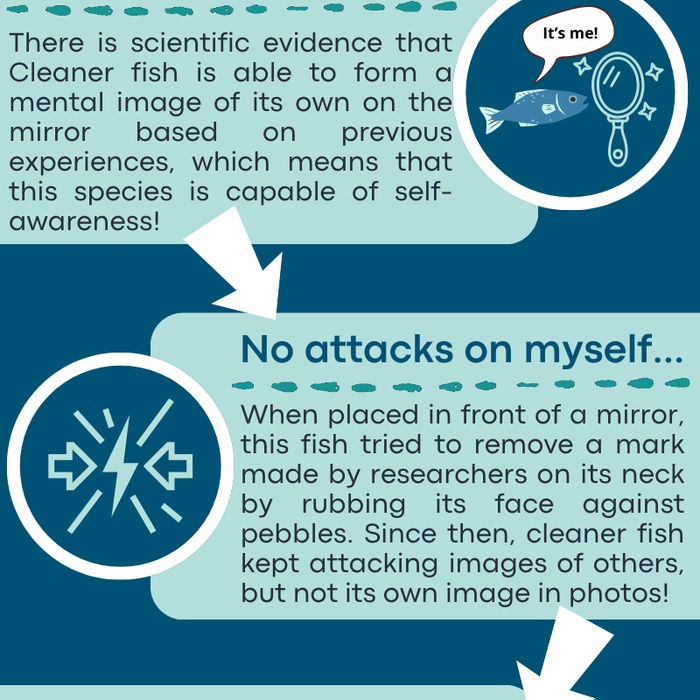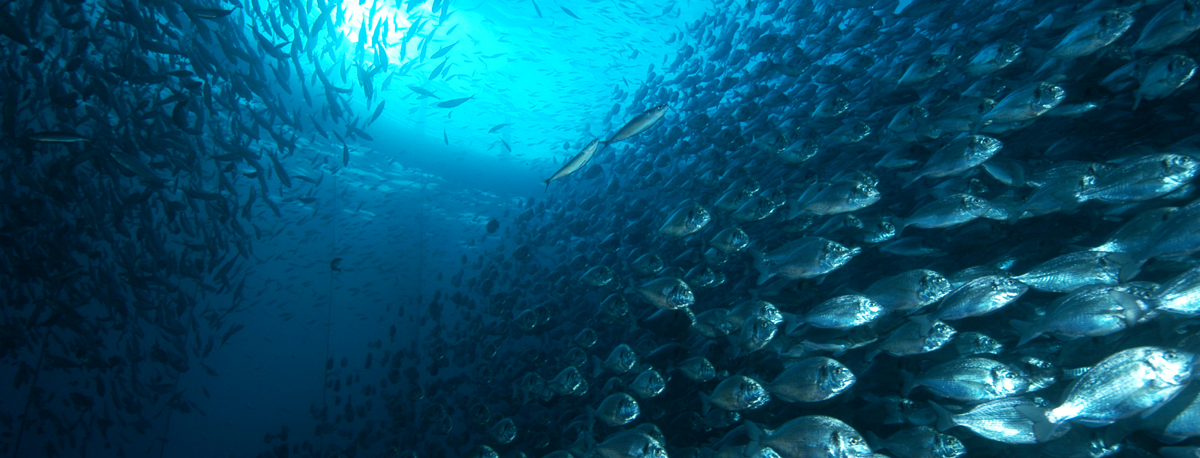New podcast episode in Portuguese!
The Fish Mind is a programme of our podcast Fish Talk that is focused on the capacity of fishes to suffer, feel other affective states, and display great cognitive abilities. The idea is to present this important information in an informal dialogue of a few minutes.
💡Last week we released our fourth episode about cognitive abilities of fishes in Portuguese too. Did you know that, like birds, fishes may build their own nests? And fish nests can serve several other functions besides spawning and parental care of their offspring. This podcast episode is focused on this topic, bringing relevant scientific evidence about nest building in fishes.
>> If you are interested, please go to our Spotify page here or to our podcast page here and listen to this episode in Portuguese
(posted on Oct. 21, 2024)
New paper published!
>> New paper published!
Our team members Caroline Marques Maia and Joao L. Saraiva co-authored a review paper with Eliane Gonçalves de Freitas, which was recently published in the Frontiers in Veterinary Science journal. In this study, the authors investigated which of the welfare criteria composing the profiles of farmed aquatic species published in the fair-fish database are most relevant to their overall welfare.
They found that welfare criteria related to reproduction, slaughtering, and substrate needs have a high potential for improving welfare conditions in farms. Since criteria related to reproduction and migration patterns showed a high level of certainty according to the available literature, improving the reproduction of farmed aquatic species by considering their natural needs and behaviours could be an effective way to enhance their welfare.
They also found important knowledge gaps on welfare criteria related to aggression, home range, aggregation patterns, stress, and malformations in general.
> If you are interested, please access the full review paper here.
(posted on Oct. 15, 2024)

Fishes are able to build nests!
Science has increasingly demonstrated over the years that fishes are animals with incredible capacities and cognitive abilities. One good example is their ability of nest building.
💡 Did you know that, like birds, fishes may build their own nests? Fish nests can serve several other functions besides spawning and parental care of their offspring. Fish nests include amazing structures in various forms, made of several different materials.
If you are interested, check out our full infographic here for more details.
(posted on Oct. 13, 2024)
Participation in the International Fish Congress in Brasil!
Our team member, Caroline Marques Maia, participated in the International Fish Congress & Fish Expo Brasil - 2024, one of the biggest events in the fish industry in Latin America. Carol talked about 'Animal Welfare: From Production to Humane Slaughter - Impact on Outcomes and a Prerequisite for Market Access', together with professor Leonardo Barcellos.
Disseminating science-based knowledge is one of our key activities to help improve the welfare of farmed fishes and other aquatic animals in a practical way. Thus, making presentations at scientific or industry events like this is also an important part of our efforts to spread the word and share knowledge about fish behaviour and welfare.
>> It was a successful opportunity to share our ideas and exchange knowledge!
(posted on Oct. 2, 2024)
Aquaculture surpassed fishing in the production of aquatic animals!
💡In 2022, aquaculture surpassed fishing in terms of tons of aquatic animals produced, according to the latest FAO report - The State of World Fisheries and Aquaculture 2024: Blue Transformation in action.
This milestone highlights the growing importance of working to improve the welfare of these animals in farming systems. Water quality, feeding, available space and stocking density, environmental structure and enrichment, handling and transport, as well as the timing of slaughter are all crucial welfare aspects of farmed aquatic animals that require attention.
> FishEthoGroup works to achieve better welfare conditions for farmed aquatic species.
(posted on Sept. 23, 2024)
New podcast episode at our fair-fish database programme!
The fair-fish database programme features short audio episodes from our Fish Talk podcast. These audios focus on species with profiles already in the database of fair-fish. We aim to provide insights into natural needs, behaviors and farming conditions or welfare hazards in fisheries for fishes and other aquatic animals, all in a few minutes.
💡Yesterday, we launched our second episode focused on a fished species. It's about Atlantic herring (Clupea harengus) caught using purse seine fishing—a profile now available in the Fair-fish database's catch branch.
> If you are interested, please go to our podcast page and listen to this new episode here.
(posted on Sept. 17, 2024)
New post at ConsCIÊNCIA Animal blog!
The Atlantic herring (Clupea harengus) is a marine fish found in the Atlantic Ocean and the Baltic Sea. Due to its small size and schooling behavior, it is one of the most heavily fished species worldwide, being usually caught with purse seine fishing method. About 3-20 billion individual fishes are captured annually.
💡 If you would like to know the main fish welfare concerns related to the capture of this herring by purse seining, take a look at our new post about this at the blog ConsCIÊNCIA Animal here.
> You can also access its WelfareCheck profile in the fair-fish database here.
(posted on Sept. 10, 2024)

Fishes are able to recognize themselves!
Science has increasingly demonstrated over the years that fishes are animals with incredible capacities and cognitive abilities. One good example is their ability of self-recognition.
💡 Did you know that, just like humans, fishes may be able to recognize themselves in a mirror? Self-recognition is a skill that until recently had only been shown in mammals. However, it's now demonstrated in a fish species too.
If you are interested, check out the full infographic here for more details.
(posted on Sept. 3, 2024)
Fish feeding on farms
High-quality feed, with a formulation that accurately reflects the nutritional needs of fishes based on their species and life stages, is crucial for their welfare in farms.
💡 However, this isn't the only important aspect of feed provided to these aquatic animals. It's essential to also consider the amount of feed offered, its size, as well as the frequency and method of distribution, to ensure a better welfare condition for these animals.
(posted on Aug. 27, 2024)
New podcast episode about fish abilities!
The Fish Mind is a programme of our podcast Fish Talk that is focused on the capacity of fishes to suffer, feel other affective states, and display great cognitive abilities. The idea is to present this important information in an informal dialogue of a few minutes.
💡 We just released our fourth episode about cognitive abilities of fishes. Did you know that, like birds, fishes may build their own nests? And fish nests can serve several other functions besides spawning and parental care of their offspring. This podcast episode is focused on this topic, bringing relevant scientific evidence about nest building in fishes.
>> If you are interested, please go to our Spotify page here or to our website here and listen to this episode.
(posted on Aug. 19, 2024)
New paper published!
Our team member Caroline Marques Maia co-authored a paper recently published in the International Aquatic Research journal. In this study, the authors investigated whether structural enrichments—useful tools for improving fish welfare on farms—also enhance the quality of tilapia fillets.
They tested the effects of artificial shelters or water hyacinth as structural enrichments during the rearing of tilapia on the physicochemical indicators of meat quality after slaughter. Fish reared with these enrichments produced higher-quality meat, indicating that, in addition to promoting the welfare of farmed tilapia, these enrichments may benefit both farmers and consumers.
> We believe that solid scientific knowledge is fundamental to improve the welfare of fishes and other farmed aquatic animals in a practical way. Thus, the publication of good quality papers in this field is the main basis for this.
> Access this new paper here
(posted on Aug. 6, 2024)
Participation in ISAE Conferences
Disseminating science-based knowledge is one of our key activities to help improve the welfare of farmed fishes and other aquatic animals in a practical way. Making presentations at scientific events is also an important part of our efforts to spread the word and share knowledge about fish behaviour and welfare.
Our team member Joao L. Saraiva participated in two regional meetings of the International Society for Applied Ethology (ISAE), one in Porto, Portugal, and another in Budva, Montenegro. João was a plenary speaker at both events, discussing 'Fish welfare: an ethological approach'.
> These were successful and fruitful opportunities to share our ideas and exchange knowledge!
(posted on Aug. 2, 2024)
New paper published!
We believe that solid scientific knowledge is fundamental to improve the welfare of fishes and other farmed aquatic animals in a practical way. Thus, the publication of good quality papers in this field is the main basis for this.
Recently, our team members María J. Cabrera-Álvarez, Pablo Arechavala-Lopez, Ana Rita Oliveira and Joao L. Saraiva co-authored a paper titled "Environmental enrichment reduces the effects of husbandry stressors in gilthead seabream broodstock." It was published in the Aquaculture Reports journal.
The authors monitored the heart rate of gilthead seabream broodstock during common husbandry procedures, including feeding, netting, cleaning and prophylactic bath. Fishes in enriched tanks had reduced heart rate and quicker recovery, thus indicating that environmental enrichment improves the welfare of this species in farms by reducing their stress.
>> If you are interested, please access this new paper here.
(posted on July 30, 2024)
New podcast episode!
Fair-fish database programme features short audio episodes from our Fish Talk podcast. These audios focus on fish species with profiles already in the fair-fish database. We aim to provide insights into natural needs, behaviors, farming conditions, and welfare hazards of fishes, as well as other aquatic animals, all in just a few minutes.
We recently launched a new type of episode. It's our first one on a fished species, specifically the Peruvian anchoveta (Engraulis ringens) caught using purse seine fishing—a profile now available in the fair-fish database's catch branch.
>> If you are interested, please go to our podcast page and listen to this new episode of the fair-fish database programme here.
(posted on July 23, 2024)
Environmental enrichment
> Facing a poor environment under farming conditions with insufficient positive estimulation is a very common situation for farmed fishes.
Environmental enrichment is a technique that helps create positive stimuli, encouraging fish interaction, enhancing their natural behaviors, and preventing or, at least, minimizing abnormal behaviors. Structural (physical), dietary, sensory, social, or cognitive enrichments are different strategies that can bring significant benefits with simple changes.
For fishes, the most commonly used strategy so far is physical or structural enrichments, which involves adding objects or structures to increase the complexity of their environment.
> If you are interested, please take a look at our papers about the use of environmental enrichment for fishes here.
(posted on July 16, 2024)


